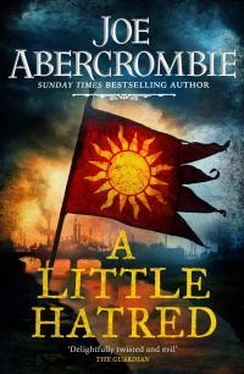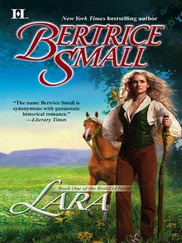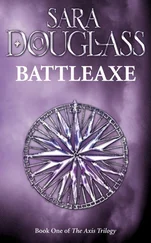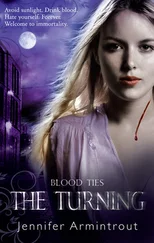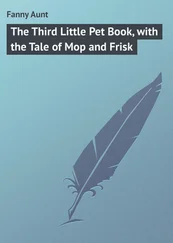The wheel might have been four times as high as a man. There was no way through it. But between its endlessly moving timbers and the slimy wall of the mill, there was a gap. A gap beyond which she saw muddy daylight, the faintest hint of a shingle beach.
She glanced back down the shadowy tunnel. No sign of pursuit. But the door would not hold for ever. They would be coming. And if they caught her …
Could she slide between the wheel and the wall? Was it possible?
She pressed her tongue into the roof of her mouth as she tried to judge the gap. What if she did not fit? Would she be dragged under and drowned? Dragged into the gears and ripped limb from limb? Would her skull be crushed like a walnut between wheel and supports? Would she be slashed, cut, nipped and nibbled as she struggled to get free, bleeding to death from a hundred wounds while she was spun helplessly over, and over, and over? She thought of that guard’s despairing wail as his arm was crushed by the machinery. But there was no other choice.
She pressed herself against the wall, breath shuddering through her teeth with fear and exhaustion, and slowly, by tiny degrees, eased one shoulder around the corner. She lowered one filthy boot into the river, fishing for the bottom, fishing, sodden petticoats clinging to her trembling leg as she eased in to the thigh and found mud. She wormed herself on, sticking to the corner, clinging to it with her shoulder blades as if her life depended on it. Which it did.
She tried desperately, pointlessly to suck herself in, suck herself flat, clutching at the sodden grip of her sword, chewing on her lip with fearsome concentration, sunlight flashing and flickering through the spinning bars. She trusted to her footing on the muddy river bottom and gradually, gradually slipped her other leg in, taking a fistful of her petticoats and dragging them hard against her in case they floated into the wheel and snatched her to her death. Killed by her own clothes fleeing a textile mill. There was a joke there somewhere.
She gasped as a bolt sticking proud of the wood caught her chest, ripped some embroidery free and nearly dragged her into the thrashing timbers of the wheel. She just managed to keep her balance, broken fingernails scrabbling at the crumbling mortar behind her, teeth rattling with terror. She edged sideways, the clammy weight of her sodden petticoats clinging to her legs, water showering her, hardly able to breathe for the rotten acid stink of the river, one cheek scraping the bricks and her eyes squeezed almost shut, her skull fit to burst with the wheel’s clatter, hammer, whirr, its mindless rage.
And with a whimper she slid free, plunged face down into the river, floundered away sobbing, gurgling, half-swimming and half-crawling. She dragged herself up onto wet shingle on quivering hands and knees. For a moment, she wanted to kiss the ground. Until she saw the foamy filth that covered it.
She looked up, wiping her wet face on the back of one trembling hand.
The river slurped past, purple and orange and green with great blooms of unnatural colour from the dye-works upstream, bobbing with refuse, churned to stinking froth by dozens of hammering waterwheels. On the left bank was a kind of beach, streaked with tidemarks of dead brown weed, scattered with the city’s flotsam, with rags and skins and broken chairs and splintered glass and rusted wire and things too far rotted to be identified, all vomited up by the tortured waters and pecked at by flocks of birds bedraggled to winged rats.
A bent-backed woman was picking through the rubbish. She stared at Savine with wild eyes, stared at the sword she still held in one hand, then scuttled away with a bloated sack over one bloated shoulder.
Savine tottered up the shingle, sodden clothes clinging to her, slapping at her. She had to find something she could hide in. She stumbled along, turning over tree branches draped with rags, plucking up broken boxes, coughing at the stink of watery rot. Flies buzzed near a corpse – pig or sheep or dog, all matted hair and dirty bone.
Savine caught sight of something beside it. An old coat, one arm torn off and the lining hanging out like offal from a carcass, but she seized on it with far greater delight than she might have the latest silks in the clothiers of Adua. Those, after all, would not save her life. This might.
Her boots were so caked with dirt, no one could have told they cost more than a house in this neighbourhood, but her petticoats, filthy with river scum, heavy as armour with river water, might give her away. She fumbled at the fastenings with bloody fingertips, ended up sawing at them with her bent sword. She was left squatting on that vile riverbank in her clinging drawers. Her corset had to stay, ripped open and with one of the bones poking out. There was no way she could reach the laces.
She dragged the muddy coat over it, a thing not even the old beggar woman had seen any value in. It stank of rot with a chemical edge that caught in her throat, but she was grateful for it. At least no one could mistake her for that leader of fashion, that scourge of ballroom and parlour, that terror of inventors and investors, Savine dan Glokta.
She wanted nothing more, right then, than to burrow into the refuse and hide. But they would be coming for her. They knew who she was. Who her father was. They would have broken down the office door by now, found the loose board. They would be following her bloody trail, through the machines, past the wheel. Any moment now, they would find her.
She scraped muck from the beach, smeared it across her stubbled scalp, down her face. She hunched over the way the old beachcomber had, dragging one filthy boot behind her. She hardly had to pretend at a limp, she had wrenched her ankle somewhere and it was starting to throb. Everything hurt. She clutched the stinking coat around her, sword tucked out of sight inside, and hobbled away leaving two hundred marks’ worth of the finest Gurkish linen slashed and ruined on the shingle.
She clambered up a low wall, into the lane behind the mill. The lane where she had seen the armed men earlier. She felt something tickle her neck. By the Fates, her earrings! The gaudy ones Lisbit had picked. She plucked them out, was about to fling them away when she realised what they might be worth. She stuffed them into the torn lining of her corset.
The sound of the machines had stopped. Now there was only a faint din of crashing metal, ripping cloth, shattering glass. They were the Breakers, after all. They could smash the whole city for all she cared, as long as they left her in one piece.
She crept to the corner of the wall, peered around it towards the gate of the mill.
There was the carriage, looking just the way it had when she got into it that morning, driver sitting with his chin squashed into his scarf, one of the horses tossing its head, harness faintly jingling. All strangely safe and normal in the empty street.
With a whimper of relief, she stumbled towards it.
The Little People
Lisbit practised her sitting-up-straight. She wasn’t sure how Lady Savine made her neck look the way she did. She couldn’t have more bones in it than anyone else. But Lisbit had been studying her, every spare moment, and she’d get the trick of it. You had to work your shoulder blades back till it felt like they’d touch, then not lift your chin exactly, but sort of lift your whole throat …
She slumped back, wriggling her shoulders. Bloody hell, it was hard work. She opened the watch, spent a moment working out what the time was, then snapped it shut with that lovely click . Lady Savine was taking a while, but she’d wait, of course, that’s what a lady’s companion did. She’d wait until the sun went out if she had to. That’s how faithful she was. Better than that brown bitch Zuri, looking down her nose and giving orders to decent people like she was better than them. Well, she wasn’t better than Lisbit, and she’d prove it. She’d finally got her chance and she meant to take it. She straightened one of the very fine lace cuffs on the very fine new dress she was wearing, gave the watch a little pat where it sat above her heart, looking so grand on its beautiful chain. Lisbit Beech, lady’s companion. It just sounded right . She deserved it. More than that bloody Zuri. What kind of a name was that, anyway? A name you’d give a doll.
Читать дальше
